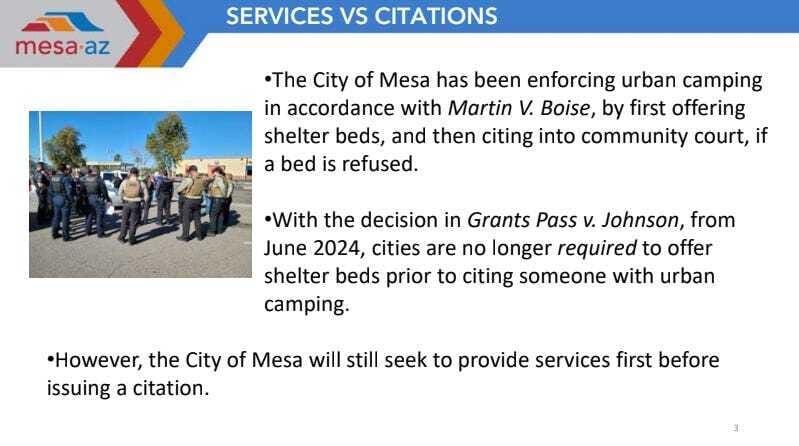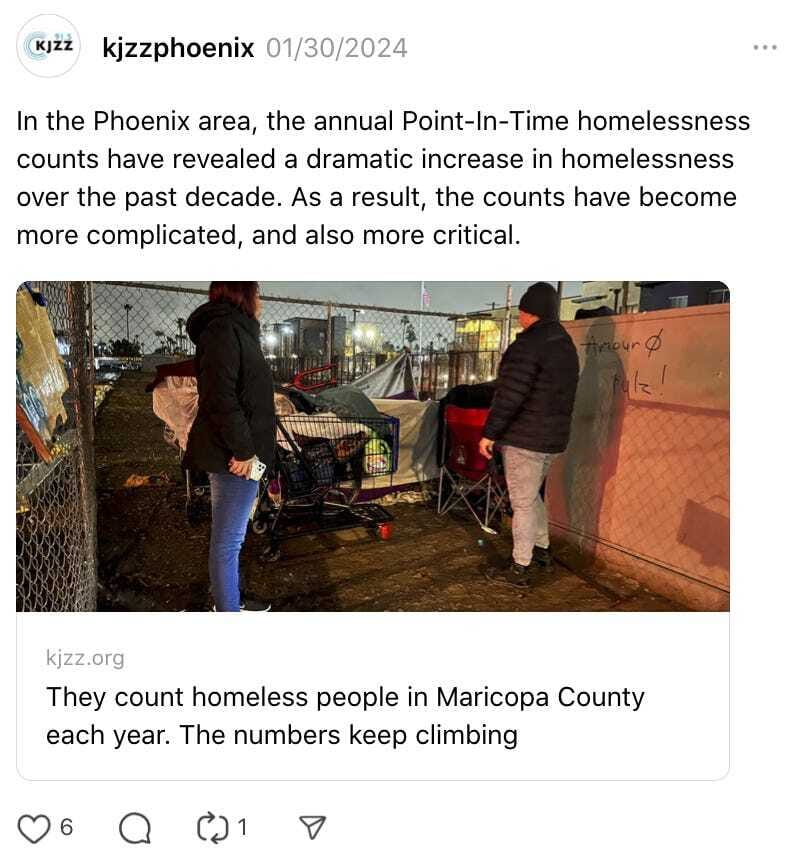When then-House Speaker Ben Toma introduced legislation to make cities enforce anti-homelessness laws, city lobbyists had a major concern: It would pit cities, towns and counties directly against federal case law.
Though a Ninth Circuit Court of Appeals ruling known as Grants Pass barred cities from displacing people if they have nowhere else to go, lawmakers sent the proposal to the ballot anyway. This month, about 59% of voters approved that legislation, Proposition 312.
But in between Prop 312’s inception and voter authorization, the Supreme Court overturned the Grants Pass ruling.
And while the fall of Grants Pass gave cities a way to legally combat homelessness, not enforcing these new bans could come with serious fiscal consequences for local governments already grappling with budget shortfalls.

Prop 312 requires municipalities to reimburse property owners for money they claim to have lost from unenforced public nuisance laws prohibiting things like panhandling, illegal camping and public urination. Starting in 2025, property owners can apply to the Arizona Department of Revenue to get a refund on their property taxes equal to the amount of expenses incurred that were “reasonably necessary to mitigate” the effects of a policy allowing the damage to happen, per the law.
The municipality has 30 days to accept or reject the claim, but the law gives property owners a cause of action to fight a rejection in court.
The state revenue department will draw from a locality’s share of state sales tax to cover the cost.
Several Arizona cities and towns had public camping bans sitting dormant in their city codes that were given new life when the Supreme Court overturned the Grants Pass ruling. Scottsdale, for example, reinstated its public camping ban in August in response to the Grants Pass ruling. Many other cities followed suit.
Each county, town or city with public camping bans — which, in reality, mostly target homeless people residing and sleeping in parks, alleyways or bus stops — can make their own policies on offering people help before displacing them. And many municipalities do.

But now, each city is required to enforce laws that criminalize the actions many homeless people take to survive.
Cities like Chandler, Gilbert, Glendale, Peoria and Tempe already had public camping bans that could now cost them if not enforced.
Other cities have reinstated camping bans after Grants Pass to combat homelessness even if shelter space isn’t available.
The City of Surprise renewed a policy allowing police to either cite people for public nuisances or take them to a treatment facility beginning Dec. 4. Goodyear just passed a similar measure.
Violations of both cities’ ordinances are considered Class 1 misdemeanors that come with up to six months in jail and up to $2,500 in fines.

On Monday, Mesa City Council voted to introduce an ordinance updating its camping ban and reclassifying the penalties for it.
On Sept. 1, Phoenix enacted a new ban on camping within 500 feet of schools, shelters, daycares or parks. The city has a storied history of addressing homelessness, largely influenced by a recent lawsuit brought by business owners and the Goldwater Institute that forced it to clear out a sprawling encampment known as the “The Zone.” That case spurred the conservative think tank to push the legislation behind Prop 312.
The business owners who sued Phoenix over the conditions near their properties will now have a state law to lean on to recoup their costs.
Joe Faillace, the former owner of Old Station Sub Shop, who joined litigants in forcing Phoenix to clear homeless people from the area surrounding his business, told ABC15 Prop 312 is “a win for anyone who has property.”
But it’s a scary situation for cities that don’t know how the law's lack of clear guidance will affect their bottom lines. And it’s even scarier for those who could be hit with fines and jail time for not having a place to sleep.

Successful / not-so-successful election: Votebeat’s Jen Fifield shadowed Jennifer Liewer, Maricopa County’s deputy elections director for communications, for a few days ahead of the election as she juggled all that it takes to pull off a successful election in one of the nation’s most populous counties. Meanwhile, Cochise County didn’t hand-count the minimum required number of ballots, auditing only 200 ballots, the Herald/Review’s Terri Jo Neff reports. That’s less than Gila County, which has less than half as many voters. In Pima County, Recorder Gabriella Cázares-Kelly sent out a long email detailing why her office stopped accepting online early ballot requests right before the election.
Never-ending / ended election: The Navajo Nation filed another lawsuit against Apache County1, this time seeking to delay certification of the county’s election canvass until Navajo voters can fix any signature problems on their early ballots, per the Navajo Times. The Navajo Department of Justice argued voters were disenfranchised after roughly 40 voters claimed the county didn’t notify them about problems with their signatures. But the Mohave County Board of Supervisors certified its election canvass without any problems after initially balking at certifying the 2022 canvass, per Today’s News-Herald’s Brandon Messick.

Trial balloon popped?: Rumors of Adrian Fontes’ alleged potential challenge to Gov. Katie Hobbs in 2026 reached DC as Politico cited three anonymous sources saying people have been trying to draft him to run a primary challenge against her. The Republic’s Stacey Barchenger asked him straight up, and Fontes answered vaguely that he’s not ruling anything out. Meanwhile, Republic columnist Laurie Roberts says while both Fontes and Attorney General Kris Mayes probably dream of challenging Hobbs, it’s safe to count them both out, given Democrats’ aversion to competitive primaries.
“Just the other day a buddy of mine was asking me to buy his truck — doesn't mean I'm going to do it,” Fontes told Barchenger.
Recount!: The race for the second House seat in Phoenix’s Legislative District 2 is so close that it’s going to a recount, the Arizona Mirror’s Jerod MacDonald-Evoy writes. Democrat Stephanie Simacek won the first seat, but Republicans Justin Wilmeth and Ari Daniel Bradshaw are within 132 votes of each other for the second seat. Also going to a recount: the Pima County Sheriff’s race, the Maricopa County Supervisors District 3 race, a Fountain Hills Town Council seat and a Page City Council seat.
Government at the speed of business: Since Arizona’s school voucher program became available to any student in the state, ESA parents have had to wait months for reimbursements for school-related expenses, the help hotline is flooded and emails to the Department of Education seeking help go unanswered, the Republic’s Nick Sullivan reports. Superintendent of Public Instruction Tom Horne says his office has an “impossible workload” and the delays will continue.
Can you help reimburse us for educating Arizonans about local government and politics? Our voucher must have been delayed again.
Fightin’ words: Arizona Republican Rep.-elect Walt Blackman told activists in Apache County that he’s sponsoring legislation to stop a Spanish energy company from building wind turbines and solar farms in the White Mountains, a project known as Lava Run, per the White Mountain Independent’s Jenn Moreira. And he accused the company of “operating in a way that may violate constitutional laws, both at the federal and state levels.”
Fighting for parking: Who has access to city curbspace is often at the source of conflict between UberEats, local taco trucks, bicyclists, drivers, shops, restaurants and others, transportation analyst Bob Pishue explained to KJZZ’s Mark Brodie in this geeky little conversation about the limited public resource you probably never think about.
“All of this is a very delicate balance that city officials and public officials are trying to deal with right now,” Pishue said.

After years of prolific tweeting, beloved local liberal Twitter account “TheRealThelmaJohnson” — affectionately known as MeeMaw — suddenly went dark in October.
A month later, another popular anonymous liberal account claimed Thelma had passed away.
RIP, if true.
But because nobody knows the real-life identity of Thelma, it’s unclear if she (or he, or they) actually truly died, or if she just stopped tweeting.
Real-life reporter Zach Buchannan of the Phoenix New Times is doing his damndest to find answers to this very modern conundrum, but he’s coming up blank.
“Really, nobody knows anything — not who runs the account, whether they're alive and why they've bid an Irish goodbye to the internet. The person behind the account may have actually died, which indeed would be unfortunate. But to this point, not a single person has proffered anything verifiable to show that's in fact the case,” he writes.

